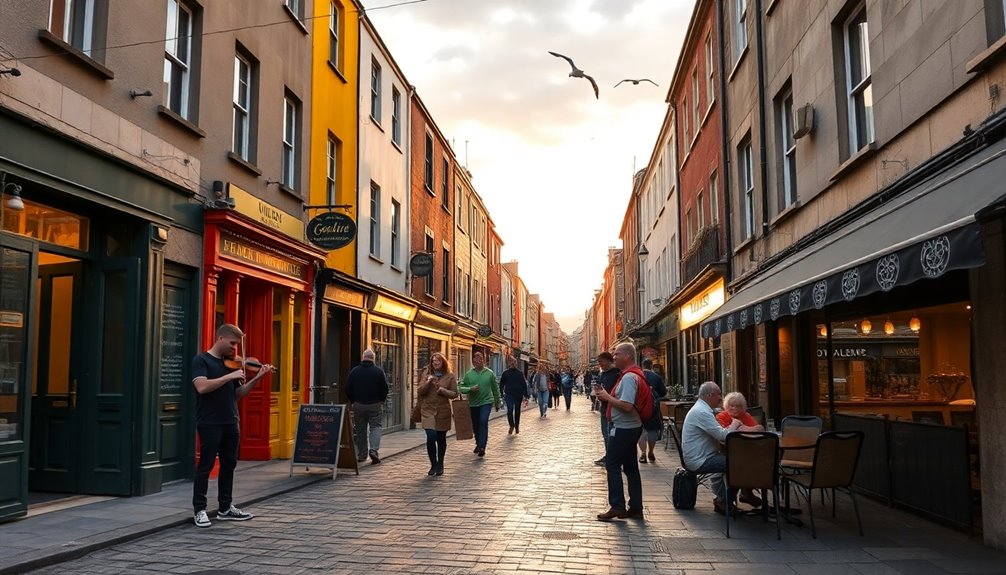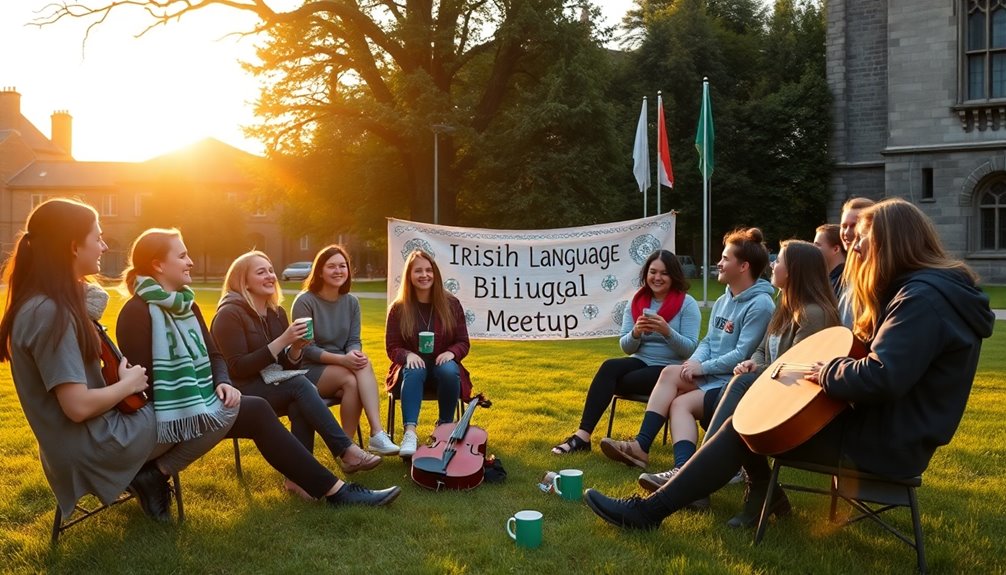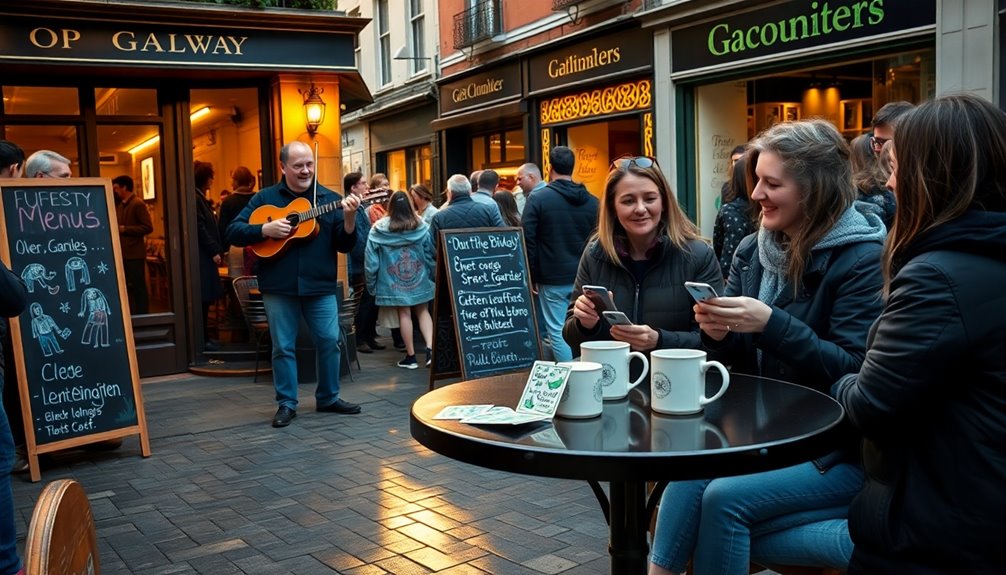
Galway’s culture isn’t only for fluent speakers — you’ll find a mix of Irish and English and people who value curiosity over perfection. Language barriers are more about rhythm and habit than exclusion, so showing up at a trad session, market, or student event gets you in. Hosts and volunteers often cue newcomers and groups are English‑friendly without losing authenticity. You’ll pick up cues, small phrases, and friendships through participation, and more practical ways to join are ahead.
Highlights
- No — Galway values curiosity and effort, not perfect fluency, so partial speakers are welcomed in many settings.
- Many events and student gatherings are English-friendly with bilingual signage and low-pressure entry points.
- Traditional music sessions and local groups use nonverbal cues and informal hosting to include newcomers.
- Volunteering, campus clubs, and markets provide manageable, conversational practice without performance pressure.
- Accessibility varies by context; ask, observe, and show up consistently to find inclusive spaces and learning opportunities.
Language and Community: Navigating Galway’s Linguistic Landscape
While Galway feels like a compact city, its linguistic scene is layered and constantly shifting, so you’ll notice Irish and English weaving through everyday life in different registers and places. You’ll observe how language barriers can appear not from hostility but from rhythm and habit — shopkeepers, poets, neighbors switching codes. That shifting invites choices: join conversations, learn a phrase, or listen and map social textures. Community engagement doesn’t demand fluency; it rewards curiosity and respectful effort. You’ll find access points — markets, music sessions, local groups — where experimenting with language opens doors rather than closing them.
Student Events Where English Is Welcome
Because Galway’s student scene mixes local tradition with an international crowd, you’ll find plenty of events designed to be English-friendly without feeling like tourist traps. You can drop into panel talks, film nights, and pop-up fairs where student networking is natural and low-pressure. Observe how organizers balance accessibility with authenticity: bilingual signage, mixed-language hosts, and informal icebreakers that nudge cultural integration without erasing local voices. You’ll gauge who’s curious versus performative, choose spaces that match your comfort, and shape connections that respect language variety. These events let you explore freely while participating in Galway’s evolving social fabric.
Traditional Music Sessions and Language Access
When you step into a Galway session you’ll notice how the room’s energy signals who’s invited to join, from reserved listeners to open ringers ready to play. Pay attention to how hosts and regulars set cues—eye contact, nods, and quiet introductions—that make bringing a new instrument or voice less intimidating. That participatory learning, where you pick up tunes and phrases by doing, often offers a clearer path to musical and linguistic confidence than formal instruction.
Session Atmosphere Inclusivity
Although sessions are often spontaneous gatherings, their atmosphere can quietly signal who feels welcome and who hangs back; you notice it in where chairs cluster, whether tunes are announced in Irish or English, and how newcomers are invited to join. You watch session dynamics unfold: eye contact, offered seats, language choice. That context shapes cultural exchange — inclusive cues let you relax, ask questions, and play without performance pressure. If code-switching and brief translations happen, you feel freer to participate. If not, you sense barriers. Observing these patterns helps you advocate small changes that open space for more people.
Learning Through Participation
If you step into a session intending to learn, you quickly see that participation is itself the primary lesson: watching a tune unfold, trying a phrase, and receiving a nod or a brief correction teaches you as much about repertoire and style as any formal class. You’re drawn into participatory activities that double as language practice; melodies and casual banter let you test phrases without pressure. Observing who leads, when dialect slips in, and how corrections circulate gives context to access barriers. Analytically, these gatherings are grassroots classrooms—community engagement that balances tradition with an open invitation for anyone ready to join.
Theatre, Spoken Word, and Accessibility for Learners
Anyone who’s watched a Galway stage or heard a spoken-word night knows how performance breathes life into fluent Irish, but learners often face barriers that make those same moments feel out of reach. You want access, not tokenism: theatre accessibility needs clear surtitles, relaxed performances, and learner-friendly programmes. Spoken word inclusivity means open mics that welcome mixed levels, bilingual slots, and prompts that invite experimentation. Observing venues, you’ll notice where intent meets practice — community initiatives bridge gaps, while ticketing and jargon push you away. Analyze structures, demand change, and claim the freedom to participate without fluency as a prerequisite.
Festivals: Participation Tips for Non-Fluent Speakers
Performance nights and theatre give you a clear picture of how Galway stages Irish in public, and festivals amplify that visibility—sometimes as welcoming showcases, sometimes as bewildering whirlwinds. You’ll find festival activities labeled clearly, with workshops, pop-up talks and listening zones where you can absorb without pressure. Observe language choices, join bilingual panels, and pick events with translations or relaxed pacing. Non fluent participation works best when you set small goals: understand a song, ask one question, share a line. Context matters — festival culture mixes tourist-facing and community threads — so choose pockets that match your comfort and curiosity.
Volunteering Opportunities That Build Confidence
When you step into volunteering roles around Galway’s Irish-speaking events, you’ll quickly spot opportunities that let you practice without the pressure of being center-stage; tasks like ticketing, welcome shifts, or scene-setting for workshops put you in contact with fluent speakers while giving you a clear, manageable purpose. You’ll notice how small responsibilities create low-stakes language loops, letting you experiment and correct in real time. This context fosters confidence building through repeated, meaningful exchanges and authentic community engagement. Analytically, the volunteer frame reduces performance anxiety and reframes learning as contribution, so you choose participation on your own terms.
Campus Clubs and Societies With Inclusive Practices

Volunteering often leads you straight onto campus, where clubs and societies offer regular, low-pressure ways to keep practicing Irish — but they also reveal how some groups deliberately shape membership to welcome learners. You’ll notice inclusive gatherings advertised with clear language policies, mixed-level conversation hours, and buddy systems so you can join without feeling exposed. Observing which clubs pair culture with diverse activities — film nights, workshops, hikes — shows intent: they’re not gatekeeping fluency but creating entry points. Analytically, that design reduces friction, normalizes mistakes, and stretches your competence while preserving choice, autonomy, and genuine cultural access.
Pub Culture and Socializing Without Perfect Fluency
Although pubs might seem like arenas for rapid-fire, idiomatic Irish, they’re often where you’ll find the most practical and forgiving social practice for learners: regulars set the tempo, conversations drift between Irish and English, and rituals—buying rounds, toasting, or trading stories—give predictable scaffolding so you can join without flawless grammar. You’ll observe pub etiquette shaping interactions: wait your turn, buy a round, listen more than speak. That social dynamics ease lets you experiment, drop phrases, laugh at mistakes, and learn cadence. You’re free to participate gradually, choosing comfort over perfection while still belonging to the scene.
Language Exchange Meetups and Conversation Partners
Pub nights give you comfortable, low-pressure chances to hear and try out Irish in context, but if you want more structured practice, language exchange meetups and conversation partners are where targeted improvement happens. You’ll find groups that balance correcting with encouragement, and you can choose partners who match your pace and interests. Observing local rhythms — market days, music sessions — helps you bring authentic topics to exchanges. Analytically, deliberate repetition with varied partners accelerates fluency more than passive exposure. This approach respects your freedom: you pick frequency, focus, and style, shaping progress that fits your life.
Practical Tips for Attending Workshops and Talks
When you show up to a workshop or talk, note how the facilitator structures the session—agenda, pacing, and when they invite questions—as that shapes how you’ll participate and what you’ll take away. You’ll scan signage and listings for workshop accessibility details, seating, sound, and captioning so you can choose events that match your needs. Observe who speaks, what language mix appears, and whether bilingual resources are offered. Ask succinctly about slide access or recording; organizers often adapt if they know attendees need options. Analyze patterns across events to pick venues that genuinely welcome varied fluency and afford you freedom to engage.
Resources for Improving Irish and English Conversation Skills

Noticing which events welcome mixed-language participation naturally leads you to look for concrete resources that strengthen spoken Irish and English. You’ll balance self-study with social practice: language apps give targeted drills and pronunciation feedback, while local conversation groups offer unpredictable, real-time exchange. Observe which formats suit your risk tolerance—structured lessons, tandem partners, or drop-in cafes—and adapt frequency to progress, not perfection. Context matters: practicing vocabulary tied to Galway life speeds integration. Analyze short-term gains against long-term fluency; pick tools that free you to experiment, make mistakes publicly, and reshape your voice in both languages.
Making Local Friends: Cultural Etiquette and Icebreakers
Although you might initially feel like an outsider, Galway’s social rhythms are forgiving if you learn a few polite cues and simple icebreakers. You’ll notice subtle cultural norms—direct warmth, joking reserve, respect for personal stories—that guide how people open up. Observe pub banter, community events, and the pace of replies; adjust your tone, mirror humor, and ask curious, open questions. Friendship building happens through consistency: show up, listen, follow local leads. You don’t need flawless language to connect; gestures, attentive silence, and small favors signal trust. With mindful adaptation, you’ll find authentic local bonds.
Some Questions Answered
Can I Experience Galway Culture as a Tourist for Just One Weekend?
Yes — you can experience Galway culture in a weekend. You’ll craft a tight weekend itinerary that balances music, pubs, markets, and a walking tour for cultural immersion. You’ll observe street performers, sample local food, and join sessions where language isn’t a barrier. Contextually, a weekend won’t capture everything, but analytically it’ll give a vivid snapshot. If you’re open and curious, you’ll feel the city’s spirit and taste its freedom.
Are There Family-Friendly Cultural Activities for Non-Fluent Speakers?
Of course you won’t understand every word, and that’s the point: you’ll still fit right in. You’ll find family events and cultural festivals built for everyone, not language tests—street music, interactive workshops, storytelling for kids, and hands-on craft stalls. You’ll observe local life, join in dances, and analyze traditions from a fresh, free perspective. These experiences let you connect emotionally and socially, even without fluency.
Do Local Employers Value Cultural Participation on Resumes?
Yes — local employers often value cultural participation on resumes because it shows community engagement, communication skills, and adaptability. You’ll find employers in Galway and similar places appreciating involvement in festivals, volunteer arts work, or language exchanges as relevant to local employment. Observationally, it signals initiative; contextually, it ties you to place; analytically, it differentiates candidates who can connect across groups, offering practical advantages in hiring and teamwork.
Are There Accessible Cultural Experiences for People With Disabilities?
Yes — you can find accessible venues and inclusive programs across Galway that welcome people with disabilities. You’ll notice ramps, hearing loops, and relaxed performances at theatres, plus tactile tours and captioned films at galleries. Observing how venues adapt shows community intent; context matters — smaller groups often offer more personalized access. Analytically, these measures expand cultural freedom, letting you participate meaningfully rather than just spectate.
Can I Practice Irish Through Sports or Outdoor Activities?
Yes — you can practice Irish through sports and outdoor activities. Imagine language blooming like wild grass on a windswept pitch: joining Irish sports clubs or guided outdoor activities immerses you in everyday phrases, slang, and friendly calls. Observationally, coaches and teammates use practical Irish; contextually, routes and fieldwork anchor vocabulary; analytically, repeated, meaningful use builds fluency. You’ll feel free, moving and speaking naturally in place and community.
Summing Everything Up
You’ll find Galway’s culture isn’t reserved for fluent speakers — it’s a lively, welcoming mix where gestures, smiles, and curiosity often speak louder than perfect Gaeilge. You’ll notice Irish and English woven together in music, theatre, and festivals, and you’ll pick up more by showing up than by waiting for fluency. Try conversation meetups, sit in on sessions, and be patient; one chat can feel like a thousand doors opening to the community’s warmth.
